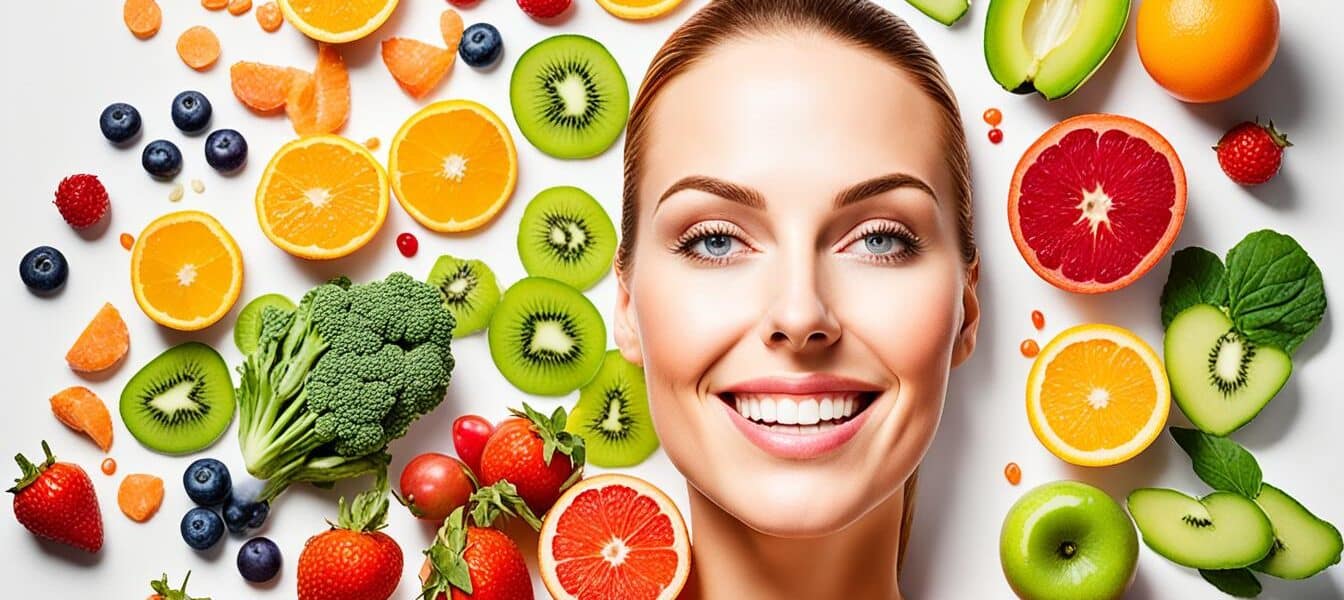Food For Beauty: 10 Diet Tips For A Natural Glow
Skin is our biggest organ, helping to keep our body temp right and protect us. It’s key for keeping the fluids in our body balanced too. Things like our genes, how old we are, our hormone levels, and even if we have diabetes can change how healthy and good our skin looks. For a skin that shines, it’s vital to feed your skin well with a diet that includes lots of antioxidant-packed fruits and vegetables, healthy fats, and drinking enough water.
Eating the right foods can help your body make new skin cells, keeping your skin looking smooth and clear. Too much sun, harsh chemicals, and eating poorly can make your skin age faster and look not so great. So, it’s important to choose foods that make your skin happy, along with taking good care of it outside.
Key Takeaways : Food For Beauty
- Skin is the body’s largest organ, with functions including regulating temperature, providing a protective barrier, and maintaining fluid balance.
- Factors like genetics, age, hormones, and medical conditions can impact skin health and appearance.
- Eating a balanced, nutrient-rich diet is essential for nourishing skin from within and achieving a glowing complexion.
- Antioxidant-rich fruits and vegetables, healthy fats, and adequate hydration are crucial for supporting skin cell turnover and maintaining skin’s softness and suppleness.
- Overexposure to sun, harsh chemicals, and a poor diet can accelerate skin aging and damage, so optimizing nutrition is key.
The Importance of Skin Health
The skin is our body’s biggest organ, making up one-seventh of total body weight. It acts as our main defense from many outside dangers. These include the sun’s harmful rays, very hot or cold temperatures, germs, and toxins. Our skin staying healthy is key for us to keep our bodies at the right temperature and to protect us from our surroundings.
Skin as the Largest Organ
Our skin is complex and does a lot. Being our largest organ, it’s amazing how it can adapt and protect us. This organ faces many different environment challenges but always keeps us safe. Its structure and function are tailored to fit these needs perfectly.
Functions of Healthy Skin
Having healthy skin means our body is well-protected. It keeps us safe by stopping harmful things from entering our body. Our skin also helps us stay at the right temperature and keeps our body’s water levels in check. That’s why we feel good and healthy when our skin is working well.
Factors Affecting Skin Health
Many things can change the way our skin looks and feels. These include our genes, how old we are, hormones, certain medical conditions, and what we choose to do. Taking good care of our skin by using the right products and eating healthy is important. It helps us keep our skin strong and looking young. Knowing what affects our skin can help us take better care of it.
Nourish Your Skin from Within
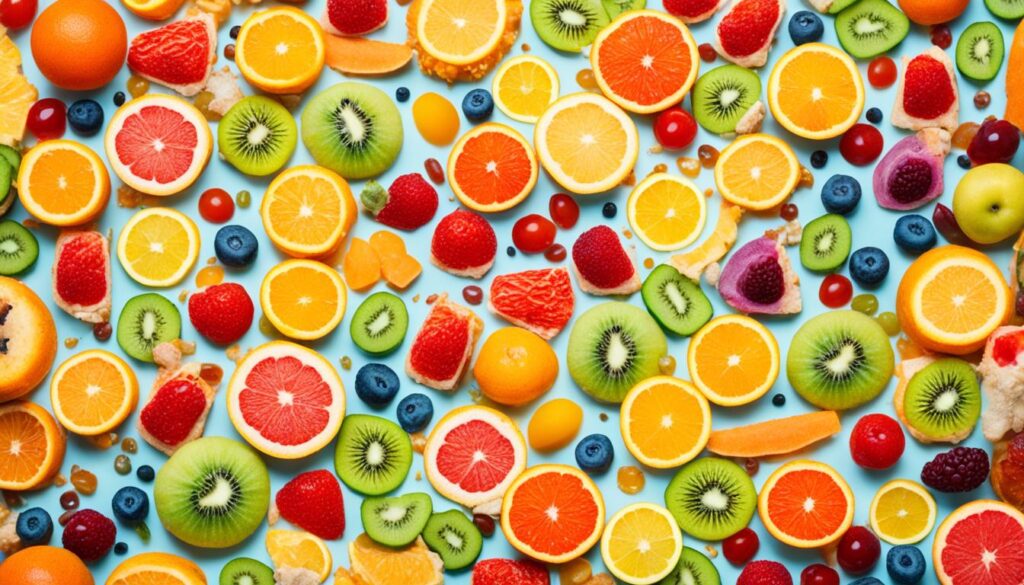
Skin cells keep renewing, needing steady essential nutrients for support. A diet full of vitamins, minerals, antioxidants, and healthy fats is key. This keeps the skin in top shape from the inside.
Nutrients for Skin Cell Turnover
For a vibrant skin, vitamins A, C, E, omega-3 fatty acids, zinc, and selenium are essential. They help maintain the skin’s health, structure, and look.
Balancing Nutrition for Healthy Skin
A variety of nutrient-dense foods like fruits, vegetables, whole grains, lean proteins, and healthy fats is vital. This approach ensures the skin gets all the essential nutrients for health and radiance.
Eat a Rainbow of Antioxidants
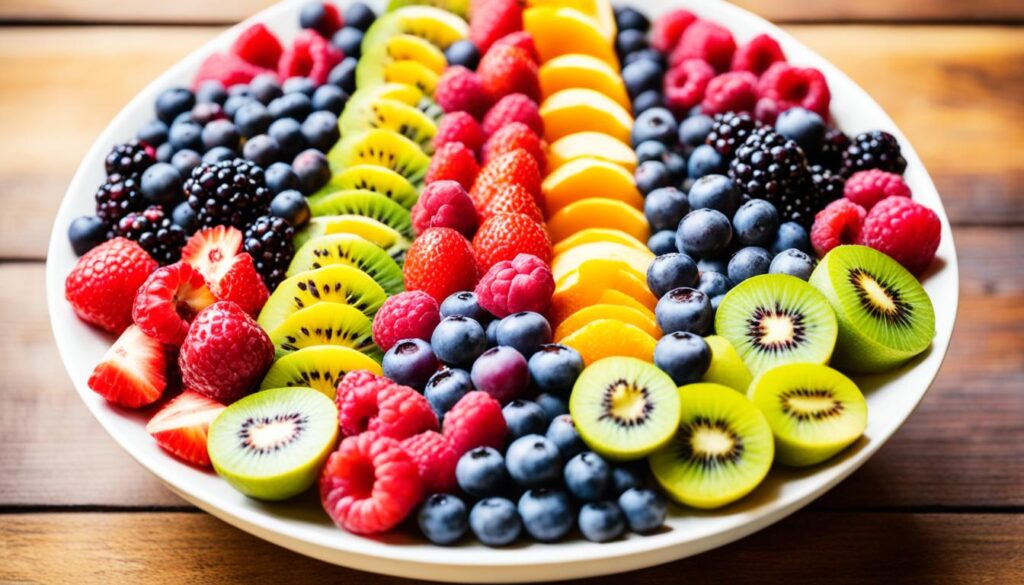
It’s key to eat various colorful fruits and vegetables for skin health. They have strong antioxidants that shield our skin from harm. This harm comes from things like the sun, pollution, and smoking, causing age spots and wrinkles.
Colorful fruits and veggies, like those in red, orange, and green, are packed with antioxidants. These include beta-carotene and lutein. They’re vital for healthy skin and for a glowing skin tone. Eating a range of these helps stop oxidative damage and keeps skin looking young.
Fruits and Vegetables Rich in Antioxidants
Top choices for skin health are antioxidant-rich:
- Red bell peppers
- Tomatoes (high in the antioxidant lycopene)
- Carrots (with lots of beta-carotene)
- Sweet potatoes (also high in beta-carotene)
- Leafy greens like spinach and kale (have lutein)
- Berries, such as blueberries and raspberries
Beta-Carotene and Lutein for Skin Health
Beta-carotene and lutein are great for keeping skin health and skin tone in check. Beta-carotene from foods like carrots guards against UV damage. Lutein in leafy greens does the same, offering protection from UV radiation for glowing skin.
Eating lots of antioxidant-rich fruits and vegetables benefits your skin. It helps nourish your skin inside and out, improving its look and feel.
Get Enough Vitamin C
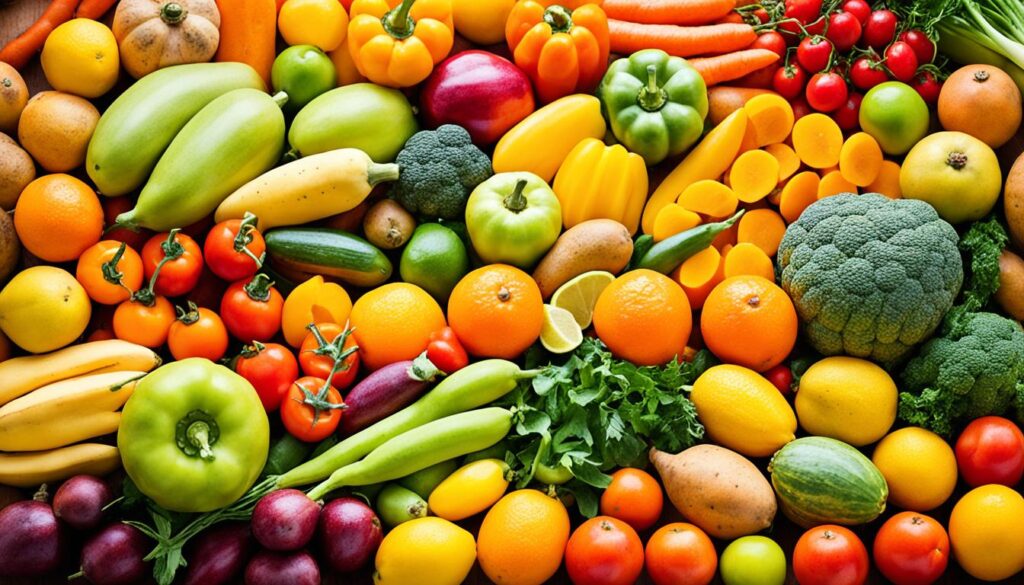
Vitamin C is crucial for skin health. It boosts the immune system and makes collagen. Collagen is what keeps skin firm and elastic. It makes up 75% of the skin’s dry weight.
This vitamin is key for collagen formation and maintenance. This keeps your skin looking firm, smooth, and young.
Vitamin C for Immune Support
Also, vitamin C acts as an antioxidant. This protects skin cells from harm by free radicals. It supports the immune system, vital for good skin health and healing.
Collagen Production and Skin Regeneration
Vitamin C helps collagen production. This leads to skin regeneration and maintains its structure and elasticity. It makes your skin look fresh, smooth, and young.
Food Sources of Vitamin C
Have vitamin C from foods like citrus fruits, berries, peppers, broccoli, and leafy greens. Eating these helps with skin health and rejuvenation.
Food For Beauty: Vitamin E and Selenium
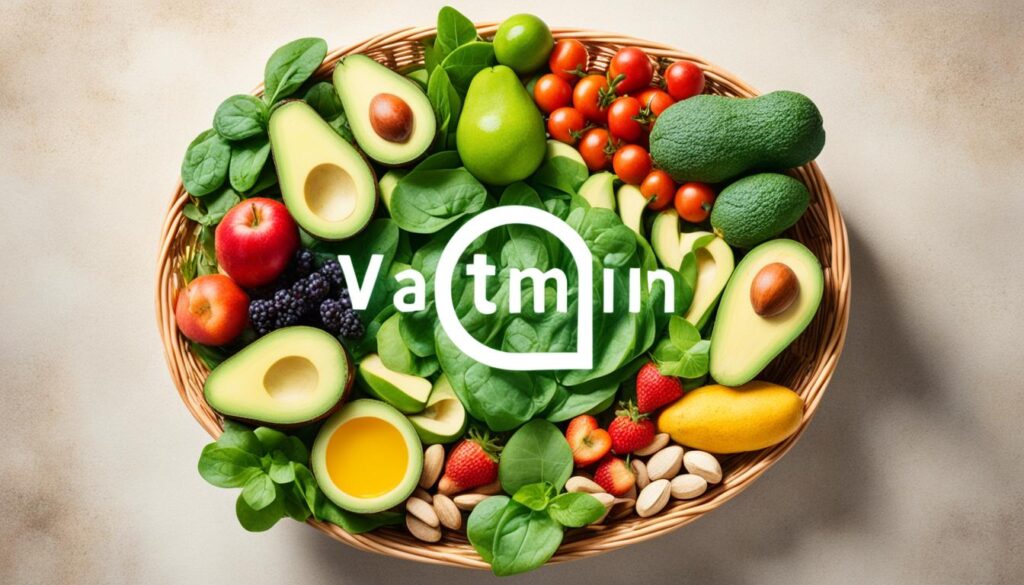
Vitamin E and selenium team up to keep our skin health in top shape. Vitamin E acts like a shield for our skin cells. It guards against damage from UV rays. This keeps our skin firm and smooth. Selenium joins in as an antioxidant. It fights off inflammation and damage from free radicals. Working together, these nutrients are key in keeping our skin health radiant.
Vitamin E for Skin Protection
Vitamin E stands as a protector for our skin. It blocks free radicals and UV harm. Because of this, vitamin E helps lessen aging signs like wrinkles. It also boosts our skin’s moisture and health.
Selenium: The Antioxidant Mineral
Then, we have selenium with its special antioxidant powers. It also fights off free radical harm and inflammation. Together, with vitamin E, they make a strong team for our skin health.
Dietary Sources of Vitamin E and Selenium
Vitamin E shines in foods like nuts, seeds, avocados, and plant oils. Selenium is aplenty in Brazil nuts, seafood, poultry, and whole grains. Adding these foods to your meals enriches and protects your skin. This leads to a glowing healthy look from within.
Healthy Fats for Supple Skin
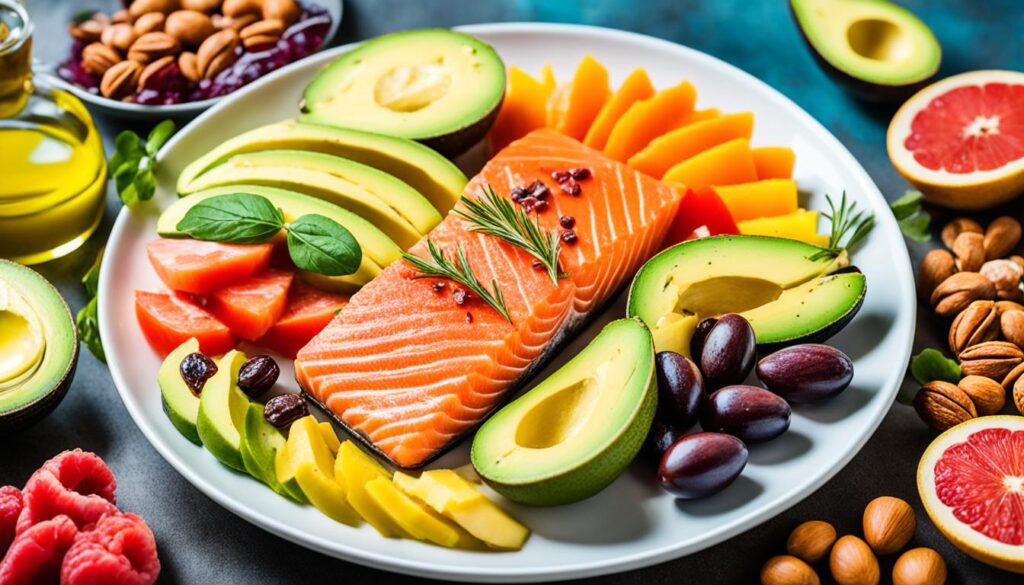
Some fats, like monounsaturated and polyunsaturated, are great for our skin. They work as natural moisturizers. This keeps our skin soft and elastic.
Monounsaturated and Polyunsaturated Fats
Avocados, nuts, and olive oil contain monounsaturated fats. They hydrate the skin and help keep its barrier strong. On the flip side, polyunsaturated fats are key for making healthy skin cells. They also lessen inflammation.
Omega-3 Fatty Acids for Skin Health
Omega-3 fatty acids are a special kind of polyunsaturated fat. They have strong anti-inflammatory effects. These fats can improve conditions like eczema and psoriasis.
Great sources of these fats are avocados, nuts, seeds, and fish like salmon. Eating them makes your skin look and feel better, keeping it young.
Phytoestrogens and Skin Health
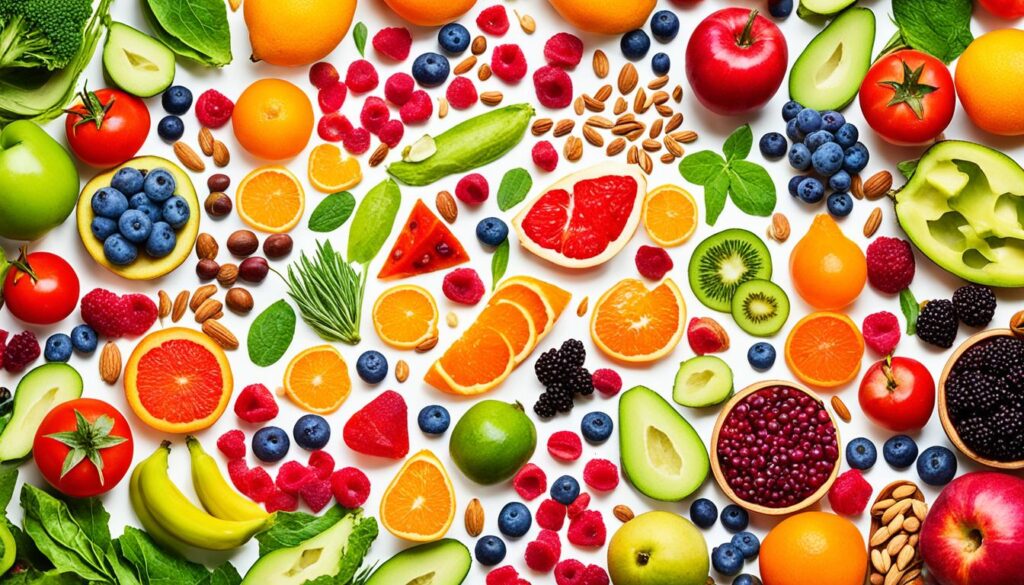
Phytoestrogens are compounds found in plants. They act like the female sex hormone, estrogen. These plant “estrogens” are vital for our skin. They help keep our skin looking young by preventing damage.
Plant Compounds Mimicking Estrogen
You can get phytoestrogens from foods like soy, flaxseeds, and whole grains. They mimic human estrogen. So, they work with estrogen receptors in our body. This produces benefits for the skin.
Soy and Whole Grains for Phytoestrogens
Soy is full of isoflavones, a special kind of phytoestrogen. They can reduce aging signs and support skin firmness. Whole grains have lignans, which balance hormones and keep skin healthy. Eating these foods helps your skin stay strong against aging and damage from the environment.
Hydration is Key
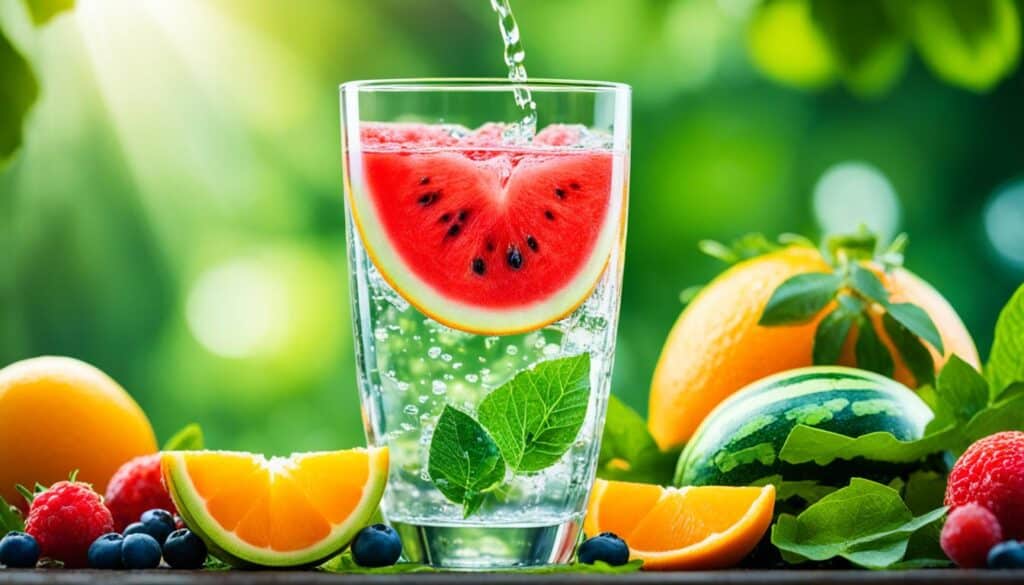
It’s crucial to keep your skin’s health and look by being well hydrated. Not drinking enough water can make your skin dry and dull. Health experts say you should drink 6 to 8 glasses of water daily to stay hydrated.
Water for Skin Moisture
By staying hydrated, your skin stays smooth and elastic. Water also helps preserve a healthy glow. It plays a role in protecting your skin from the outside world and keeps your face looking radiant.
Hydrating Fruits and Vegetables
Other than water, fruits and vegetables can boost skin moisture. Water-rich foods like watermelon, cucumbers, and courgettes are great for your skin. Eating these hydrating foods keeps your skin moist, your skin’s needs satisfied, and your face glowing.
Also Read: How Wearing Makeup During Workouts Can Damage Your Skin
Conclusion
To get radiant, healthy-looking skin, what you eat matters a lot. Eating a balanced diet rich in nutrients is essential. It gives your skin the vitamins, minerals, antioxidants, and healthy fats it needs. These things make your skin look young.
Eat plenty of skin-supporting foods like fruits, veggies, nuts, seeds, and good fats. They shield your skin from harm, help make collagen, and keep it soft and moist. Choosing what you eat wisely is crucial for a natural, healthy glow.
Nurturing a glowing skin means taking care of your body inside and out. Pick foods that help your skin thrive and meet its skin needs. A skin-friendly diet is a powerful and easy way to bring out your skin’s natural beauty.
Choosing the right food is the first step to beautiful, young-looking skin. A nutrient-rich diet is your way to a vibrant, confident look. Let your diet build a solid base for skin that shows your well-being.
FAQs
Q: What are the best foods for healthy skin?
A: Some of the best foods for healthy skin include green tea, walnuts, broccoli, and avocado.
Q: How can green tea benefit the skin?
A: Green tea is rich in antioxidants that help protect the skin from damage caused by free radicals, improving skin texture and overall health of the skin.
Q: Why are walnuts good for your skin?
A: Walnuts are a good source of essential fatty acids that may help prevent skin problems such as acne and dry skin, and even skin tone.
Q: What does broccoli do for the skin?
A: Broccoli contains sulforaphane, which has anti-inflammatory properties and may help reduce the risk of skin cancer and protect the skin from UV damage.
Q: How can avocado help your skin?
A: Avocado is rich in beta carotene and antioxidants that may help improve skin health, reduce skin inflammation, and protect against damage caused by free radicals.
Q: What role does resveratrol play in skin health?
A: Resveratrol, found in foods like red peppers and red wine, may protect the skin from free radicals that damage the skin and help maintain skin health.
Q: Why are red peppers beneficial for the skin?
A: Red peppers are rich in antioxidants that help combat free radicals, making them beneficial in protecting the skin from damage caused by the sun’s rays.
